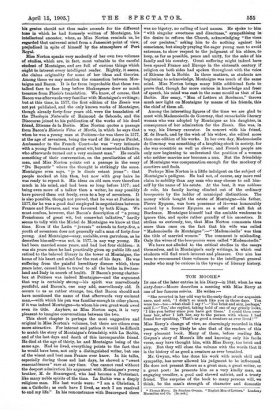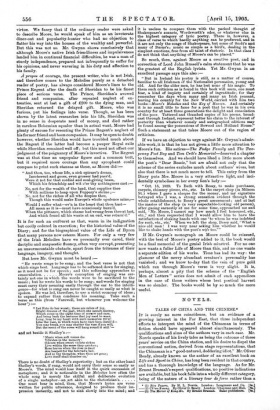TOM MOORE.* IN one of the later entries in his
Diary—in 1843, when he was
sixty-four—Moore describes a meeting with Miss Berry at one of her famous soirees. He writes :- " She reverted in her odd way to the early days of our acquaint- ance, and said, I didn't so much like you in those days. You were too—too—what shall I say ?'—' Too brisk and airy, perhaps,' said Yes,' she replied, taking hold of one of my grizzly locks, I like you better since you have got these.' I could then over- hear her, after I left her, say to the person with whom I had found her speaking, That's as good a creature as ever lived !'"
Miss Berry's change of view, so charmingly recorded in this passage, will very likely be also that of the readers of this very pleasant book. Many of them, before reading Mr. Gwynn's story of Moore's life and knowing only his facile verse, may have thought him, with Miss Berry, too brisk and airy. But they will close the volume with the words that it is the history of as good a creature as ever breathed.
Mr. Gwynn, who has done his work with much skill and sympathy, has never allowed his judgment to be influenced. He does not present Moore as a great man, a great writer, or
a great poet: he presents him as a very kindly man, an engaging versifier, a good and shrewd satirist, and a trusty friend. The surprise of the book to many persons will, we think, be the man's strength of character and domestic * Thomas Moore. By Stephen Gwynn. "English Men of Letters." London) Macmillan and Co. [2*. net.)
virtue. We fancy that if the ordinary reader were asked to describe Moore, he would speak of him as an inveterate diner-out and popularity-hunter who had no objection to flatter his way into the houses of the wealthy and powerful.
But this was not so. Mr. Gwynn shows conclusively that although Moore's native Irish friendliness and impulsiveness landed him in continual financial difficulties, he was a man of sturdy independence, prepared not infrequently to suffer for his opinions, and never wavering in his duty and affection to his family.
A propos of courage, the present writer, who is not Irish, and therefore comes to the Melodies purely as a detached
reader of poetry, has always considered Moore's lines to the Prince Regent after the death of Sheridan to be his finest piece of serious verse. The Prince, Sheridan's avowed friend and companion, after repeated neglect of en- treaties, sent at last a gift of £200 to the dying man, and Sheridan returned the delayed gift. Moore, who was furious, put his feelings into verse. Though, as has been shown by the latest researches into his life, Sheridan was in no sense in desperate need of money, and died rather in careless Bohemian squalor than in actual want, Moore had plenty of excuse for resenting the Prince Regent's neglect of his former friend and boon companion. It may be open to doubt, however, whether Sheridan would have troubled much about the Regent if the latter had become a pauper Royal exile while Sheridan remained well off ; but this need not affect our judgment of the poignancy of Moore's invective. The Regent was at that time an unpopular figure and a common butt, but it required more courage than any sycophant could compass to print such stanzas as these, as Moore did :-
" And thou, too, whose life, a sick epicure's dream, Incoherent and gross, even grosser had pass'd, Wore it not for that cordial and soul-giving beam, Which his friendship and wit o'er thy nothingness cast:—
No, not for the wealth of the land, that supplies thee With millions to heap upon Foppery's shrine ;- No, not for the riches of all who despise thee, Though this would make Europe's whole opulence mine ;— Would I suffer what—ev'n in the heart that thou haat- All mean as it is—must have consciously burn'd, When the pittance, which shame had wrung from thee at last, And which found all his wants at an end, was return'd."
It is for such an outburst as that, warm in its indignation but coolly ordered in execution; for the historical value of the Diary ; and for the biographical value of the Life of Byron that many persons now esteem Moore. For only a very few of the Irish Melodies have we personally ever cared, their dactylic and anapaestic fluency, often very corrupt, presenting an unsurmountable obstacle, apart from the triteness of their language, imagery, and thought.
But here Mr. Gwynn must be heard :—
" He wrote songs to be sung; and the best verse is not that which sings best. Language has to be softened down for singing, as it need not be for speech ; and this softening approaches to emasculation Moore's conception of singing was cer- tainly not one in which the words were to be sacrificed to the music ; but he wrote his words to be sung ; and words for singing must carry their meaning easily through the ear to the intelli- gence—for what is sung can never be caught so easily as what is spoken. He was led, therefore, to use a strict economy of ideas ; to expand rather than condense his meaning. Take such a verse as this (from Farewell, but whenever you welcome the hour') :- " Let Fate do her worst ; there are relics of joy, Bright dreams of the past, which she cannot destroy, Which come in the night-time of sorrow and care, And bring back the features that joy used to wear. Long. long be my heart with such memories tIll'd! Like the vase, in which roses have once been Yon may break, you may shatter the vase if you will, But the scent of the roses will hang round it still '- and set beside it Shelley's :- ' Music when soft voices die
Vibrates in the memory: Odours when sweet violets sicken
Live within the sense they quicken;
Bose leaves when the rose is dead
Are heaped for the beloved's bed,
And so thy thoughts, when thou art gone ; Love itself shall slumber on.'
There is no doubt of Shelley's superiority ; but on the other hand Shelley's words, if sung, would not carry their sense so easily as Moore's. The mind would lose itself in the quick succession of metaphors; and it is noticeable in the Melodies how often the whole song is merely the skilful and deliberate evolution of a single metaphor—an ,art akin to the rhetorician's One must bear in mind, then, that Moore's lyrics are verse written for public utterance, designed to produce their im- pression instantly, and not to sink slowly into the mind; and it is useless to compare them with the packed thought of Shakespeare's sonnets, Wordsworth's odes, or whatever else in the highest category of lyric poetry. There is, however, a class of verse to which hardly anything can be preferred, and in it are not only the songs of Shakespeare, but some of Scott's and many of Burns's ; music as simple as a bird's, dealing in the simplest emotions, free from all taint of rhetoric. In that class I do not think that anything of Moore's can be placed."
So much, then, against Moore as a creative poet, and in correction of Lord John Russell's calm statement that he was the greatest of the English lyrists. Yet Mr. Gwynn in an excellent passage says this also :-
" But in Ireland his poetry is still, as a matter of course, familiar to all Irishmen of the Nationalist persuasion, young and old. And for the older men, he has lost none of his magic. To them such criticism as is found in this book will seem, one must fear, a kind of impiety and certainly of ingratitude ; for they remember the days when many and many an Irish peasant, leaving his country for the New World, carried with him two books—Moore's Melodies and the Key of Heaven. And certainly it is no small title to fame for a poet that he was in his own country for at least three generations the delight and consolation of the poor. Tattered and thumbed copies of his poems, broad- cast through Ireland, represent bettor his claim to the interest of posterity than whatever comely and autographed editions may be found among the possessions of Bowood and Holland House."
Such a statement as that takes Moore out of the region of criticism.
If we have an objection to urge against Mr. Gwynn's admir- able work, it is that he has not given a little more attention to Moore's fun. His satires—The Fudge Family and The Two- penny Post Bag and Tom Crib's Memorial—deserved a chapter to themselves. And we should have liked a little more about the poet's "Dear Bessie," but are afraid not only that the scheme of the series excludes much about authors' wives, but also that there is not much more to tell. This entry from the Diary puts Mrs. Moore in a very attractive light, and inci- dentally symbolises in her every lion's lady :— " Oct. 15, 1829. To Bath with Bossy, to make purchases, carpets, chimney pieces, etc., etc. In the carpet shop (in Milsom St.) where I gave a cheque for the money, and my signature betrayed who I was, a strong sensation evident through the whole establishment, to Bessy's great amusement ; and at last the master of the shop (a very respectable-looking old person), after gazing earnestly at me for some time, approached me and said, Mr. Moore, I cannot say how much I feel honoured. etc., etc.,' and then requested that I would allow him to have the satisfaction of shaking hands with one 'to whom he was indebted for such, etc., etc.' When we left the shop, Bessy said, What a nice old man ! I was very near asking him whether he would like to shake hands with the poet's wife too.'" If Mr. Gwynn's monograph on Moore could be reissued, with the best of Moore's poetry added to it, the book would be a final memorial of the genial Irish minstrel. For no one now wants a fuller Life of Moore than this, and no one wants a separate edition of his works. Time has had its way: the glamour of the merry abundant creature's personality has vanished ; and we know to-day that the vein of pure gold which ran through Moore's verse is very slight. It is, perhaps, almost a pity that the scheme of the "English Men of Letters " series does not admit of such appendices in the case of those writers whose best poetical harvest was so slender. The books would be by so much the more useful.











































 Previous page
Previous page